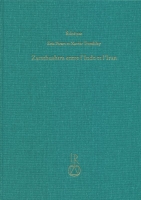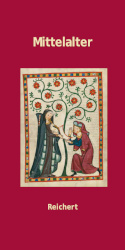Search
Editors: Tremblay, Xavier; Pirart, Eric
Zarathushtra entre l’Inde et l’Iran
Études indo-iraniennes et indo-européenes offertes à Jean Kellens à l’occasion de son 65e anniversaire
2008
17.0 x 24.0 cm, 390 p., 1 illustrations b/w, 8 tables, cloth
ISBN: 9783895006517
17.0 x 24.0 cm, 390 p., 1 illustrations b/w, 8 tables, cloth
110,00 €
ISBN: 9783895006517
Short Description
Twenty-seven articles by prominent Indo-Europeanists, Indologists and Iranists have been selected to commemorate the most innovative and consequent exeget of Avesta (the missal of the pre-islamic Paniranian religion, Mazdaeism or Parsism) of our times, Jean Kellens and to inscenery his intellectual pathway and thereby also the present debates around the oldest language and religious history of the common ancestors of Indians and Iranians. The themes Jean Kellens has put into fresh light, intertextuality, stilistics, ideology, textual history and reuse, are especially represented, but always under the light of the mother discipline: grammar.Description
Uniting the ingenuities of 27 leading indo-europeanists, indologists and iranists from 11 countries (Belgium, France, Germany, Italy, Japan, Netherlands, Poland, Spain, Sweden, United Kingdom, and United States) to celebrate Avestan studies through their acknowledged master Jean Kellens, Professor at the Collège de France (Paris), is already a rare feat, but the present Festschrift was designed to offer still more. The contributors have been chosen in order to illustrate all stages of Jean Kellens’s pathway, first a pupil of Jacques Duchesne-Guillemin in Liège, then of Karl Hoffmann in Erlangen and later of his earliest disciple Helmut Humbach in Mainz at a time (the seventies) when Erlangen was the cauldron whence all innovations in Indo-European studies squirted out, and to discuss the paradigm shifting Jean Kellens introduced in the exegese of the Avesta, the missal and holiest book of the pre-Islamic Paniranian religion, Mazdaeism alias Parsism. The introduction, but also many anarticle make hints to the dilemmas that have shaped the debate around the oldest Iranian history. Since the very first encounter of European scholarship with the Avestan text the discrepancy between it and the Greek and Western accounts (or merely expectations?) and the very difficulty of the philology stirred up a controversy whether it was a patchwork of
fragments sewn together at a late period (say the Sasanid Empire), yielding no sense when put together and whose linguistic value could be appreciated only after a painstaking disentangling and throwing off the disguise of the transmission, or whether it was constituted by large coherent units. Jean Kellens cut the Gordian knot insofar as he sought after formal clues for original composition (reiteration of labelling formulae for instance) and, on the other hand, after ancient joints and commentaries of older pieces, already remixed by the Avestan priests. Thereby he diverted the question from the intention of the (mythical) Primeval Poet towards the purpose, reaffectation and ideology of the texts in a priestly ritual – the selfavowed genre of Avesta itself. Most contributors have taken issue with various aspects of this Kellensian rejuvenation of Avestan studies, which results principally from an explicitation and application to the textology of the methods and results of the “Erlangen silent linguistic
revolution”: Alberto Cantera, Gnoli, de Jong, Herrenschmidt, Janda, Lincoln, Oettinger, Panaino, Pirart, Skjærvø and Swennen. Religious history, stylistics and metrics (other favourites of Kellens’s) are illustrated by the articles of Andrés Toledo, Heiner Eichner, Berhard Forssman and Eva Tichy. One must not forget, however, that Jean Kellens has been first known as the best specialist for the Avestan language, and his epoch-making manual „Le Verbe Avestique“ inspired contributions from García-Ramón, Goto, Junko Sakamoto-Goto und Nicholas Sims-Williams, whereas Xavier Tremblay submitted to a new scrutiny, a phonetic law suggested by the jubilary in 1976.
The Festschrift for Jean Kellens should also remain as a memorial for the method whichproved so successful in the hands of the Erlangen School of Indo-Europeanists: only a fresh return to the sources, free from any preconceptions, strictly abiding to the grammatical rules, recording step by step every induction and pondering every concurrent possibility, however counterintuitive or bizarre it may seem, will yield ripe crops.
Biographical Note
Éric Pirart (born in 1950) studied Indo-Iranian philology at the University of Liège, where he earned his Doctorate with a thesis upon the Old Avestan particles, supervised by Jean Kellens. He then embarked with his master on the enterprise of editing, translating and commenting the Old Avestan corpus (Les textes vieil-avestiques, 3 Bände, Reichert, Wiesbaden, 1988-1990-1991), whereas he pursued own studies upon Indo-Iranian mythology (Les Nāsatya (Bibliothèque de la Faculté de Philosophie et Lettres de l’Université de Liège CCLXI & CCLXXX, Droz, Geneva, 1995-2000) und Mitología y Religión del Oriente Antiguo. III : Indoeuropeos [in cooperation with A. Bernabé, C. García Gual & R. Lemosín], Ausa, Sabadell, 1998). After an almost six-year appointment at the University of Barcelona to teach Sanskrit and Old Iranian, he became Professor at the University of Liège, directing the Program of Indo-Iranian studies and Comparative Indo-European Linguistics (now the sole of its kind in Belgium). His numerous articles (mostly published in the Journal Asiatique) and books (L’éloge mazdéen de l’ivresse. Édition, traduction et commentaire du Hōm Stōd; Guerriers d’Iran. Traduction annotée des textes avestiques du culte zoroastrien rendu aux dieux Tištriya, Mivra et Vrvragna; L’Aphrodite iranienne. Étude de la déesse Arti, traduction
annotée et édition critique des textes avestiques la concernant; Georges Dumézil face aux démons iraniens, Collection Kubaba. Série Antiquité, vols. 4, 8, 10 and 14, L’Harmattan Paris, 2004, 2006, 2006, 2007) have earned him fame as an expert in Indo-Iranian mythology, Yašt philology and text history of the Avesta, especially concerning the diascevase and the metrics.
Xavier Tremblay
After a PhD about the Noms athématiques suffixaux de l’Avesta at the École pratique des Hautes Études, philological-historical branch (Paris), Xavier Tremblay (born in 1971 in Lille, in Northern France) worked from 1999 to 2003 as a Research Fellow at the Institute of Iranian Studies of the Austrian Academy of Sciences, which awarded him the Figdor Prize for his book Pour une histoire de la Sérinde (SÖAW 690, Vienna, 2001). He earned a German Habilitation with venia legendi in Indo-European comparative linguistics in 2004 at the University of Cologne with a monography Grammaire comparée et grammaire historique : quelle réalité est reconstruite par la grammaire comparée ? (in Gérard Fussman, Jean Kellens, Henri-Paul Francfort & Xavier Tremblay, Āryas, Aryens et Iraniens en Asie Centrale, Collège de France, Paris 2005) crowned by the Prix Emile Benveniste of the French Académie des Inscriptions et Belles-Lettres in 2008. Since 2004 Privat-Dozent at the University of Cologne, Xavier Tremblay has authored one further book, La déclinaison des noms de parenté en indo-européen (Innsbruck, 2003), and over 40 articles and 20 recensions about the whole range of Indo-European languages.
Series Description
The series Beiträge zur Iranistik was founded in the 1960s by Georges Redard and subsequently edited by Nicholas Sims-Williams from 1997 to 2020; the present series editor is Agnes Korn. The series publishes works on the languages of the Iranian branch of Indo-European. The focus is on linguistics, including grammars, dictionaries, text editions, philology as well as diachronic and synchronic studies of linguistic topics. Neighbouring fields such as literature, archaeology and anthropology are likewise represented. The languages of the series are English, German and French. The Beiträge zur Iranistik are represented in libraries internationally and are widely used standard works of Iranian studies.Verwandte Reihen:




 Preface
Preface

 Neuerscheinungen 2023/2024
Neuerscheinungen 2023/2024
 Gesamtverzeichnis 2023/2024
Gesamtverzeichnis 2023/2024
 Katalog Oriental Studies & Linguistics
Katalog Oriental Studies & Linguistics
 Mittelalter
Mittelalter
 Deutsche Inschriften
Deutsche Inschriften
 Musiktherapie
Musiktherapie
 Literaturen im Kontext
Literaturen im Kontext